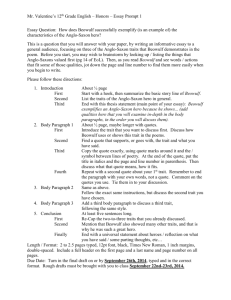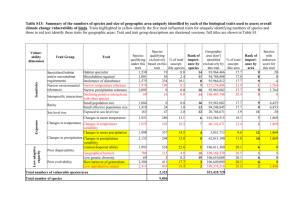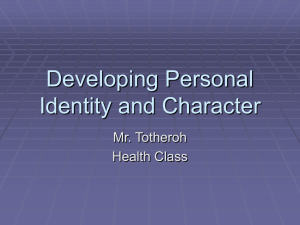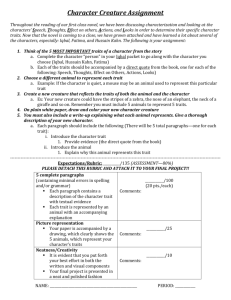Life-Sized Character Project
advertisement
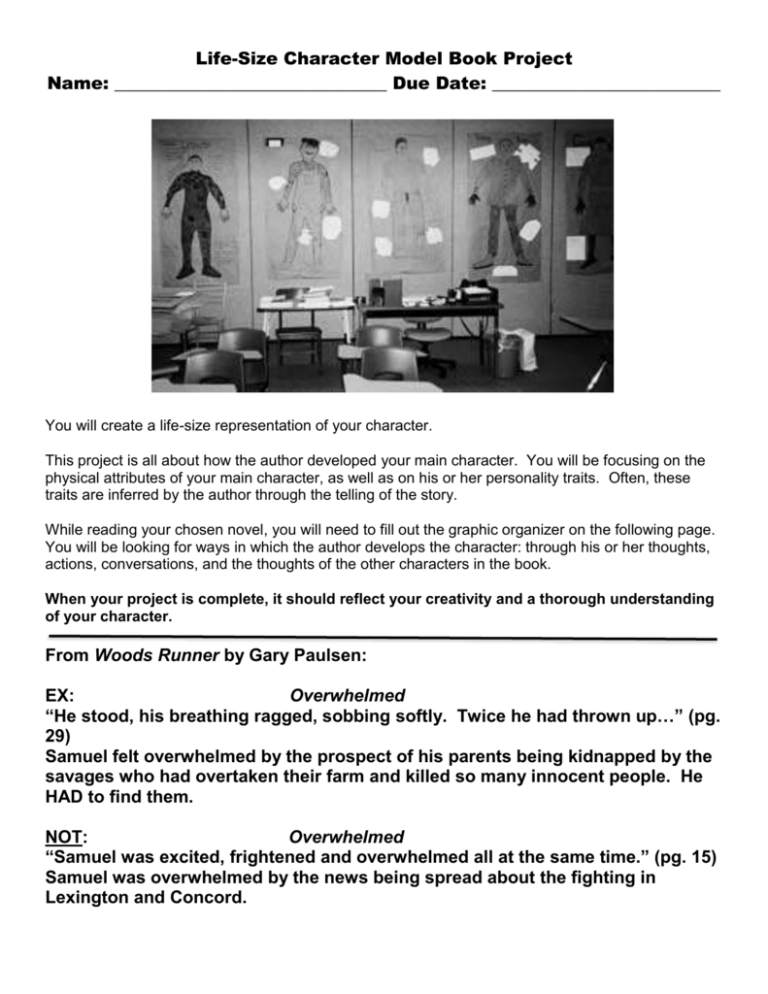
Life-Size Character Model Book Project Name: _______________________________ Due Date: __________________________ You will create a life-size representation of your character. This project is all about how the author developed your main character. You will be focusing on the physical attributes of your main character, as well as on his or her personality traits. Often, these traits are inferred by the author through the telling of the story. While reading your chosen novel, you will need to fill out the graphic organizer on the following page. You will be looking for ways in which the author develops the character: through his or her thoughts, actions, conversations, and the thoughts of the other characters in the book. When your project is complete, it should reflect your creativity and a thorough understanding of your character. From Woods Runner by Gary Paulsen: EX: Overwhelmed “He stood, his breathing ragged, sobbing softly. Twice he had thrown up…” (pg. 29) Samuel felt overwhelmed by the prospect of his parents being kidnapped by the savages who had overtaken their farm and killed so many innocent people. He HAD to find them. NOT: Overwhelmed “Samuel was excited, frightened and overwhelmed all at the same time.” (pg. 15) Samuel was overwhelmed by the news being spread about the fighting in Lexington and Concord. Steps: 1. While reading your book, notice the physical and personality traits of your main character. Take notes while you’re reading on the graphic organizer I provided so that you can easily transfer the information onto your final character model. 2. You will need to list at least 10 character traits that describe your main character. For each character trait, you must find a quote in the book that proves your character has that particular trait. Beneath each quote, write what you think the quote reveals about your character. a. At least one trait must be connected to your character’s heart: What is his or her main goal in life? Write this next to his or her heart. b. At least one trait must be connected to your character’s eyes: How does your character see the world? Write this outside the head near the eyes. c. At least two traits must be connected to your character’s hands: What does your character do and how do they relate to others? Write these on your character’s arms and hands. d. At least two traits must be connected to your character’s head: What is inside your character’s mind? His or her innermost thoughts and feelings? Write these outside the brain. e. At least two traits must be connected to your character’s feet: What lies ahead for your character? What is his or her destiny? Write these on your character’s legs and feet. f. You must also include somewhere on the body at least one character trait and quote showing how your character has changed from the beginning to the end of the novel. g. At least one quote from another character that shows how others perceive your character: Write this on the body where you think it fits. 3. Take the large piece of bulletin board paper and have a classmate trace your body onto the paper. Be sure to position your body in a way that expresses their personality. 4. Outline the body shape with black marker. 5. Clothe your character in a way that represents his or her personality or role in the story. Pay attention to the time period in which the book is set: this will affect the way your character dresses. 6. Add facial features, hair, jewelry, etc. Be creative and detailed. You may draw these features or use other materials to make the details stand out. 7. Once your project is clothed, use a fine-tipped marker to neatly transfer the information from your graphic organizer onto your finished character. This is a finished project for a major grade, so there should be no scratch-outs or misspelled words. 8. You must put the character’s name, the title of the book, the author and your name somewhere on the front of the finished product. Life-Size Character Model Planning Sheet Directions: Think of 10 strong adjectives (character traits) that describe your character and write them in the boxes. Underneath each adjective, find a quote from your book (textual evidence) that shows proof that your character has that particular character trait. The quote will not use that exact word, but it will prove why you say your character has that trait. Be sure to put the page number of the book on which you found that quote. 1. (Trait connected to heart) 6. (trait connected to feet) (Quote) pg.___ (Quote) pg.___ My Analysis: My Analysis: 2. (trait connected to eyes) 7. (trait connected to head) (Quote) pg.___ (Quote) pg.___ My Analysis: My Analysis: 3. (trait connected to hands) 8. (trait connected to head) (Quote) pg.___ (Quote) pg.___ My Analysis: My Analysis: 4. (trait connected to hands) 9. (trait showing change) (Quote) pg.___ (Quote) pg.___ My Analysis: My Analysis: 5. (trait connected to feet) 10. (trait based on other character) (Quote) pg.___ (Quote) pg.___ My Analysis: My Analysis: Life-Size Character Model Rubric Name: ___________________________________________________ Date: ___________________________________ Character Traits I used at least 10 strong adjectives to describe my character. Quotes I found quotes from the book to support the 10 character traits I used. I surrounded the quotes with quotation marks and put an accurate page number after each one. Beneath each quote, I analyzed what this revealed about my character. I have clothed my character in a way that fits the description given by the author and the other characters. My character is uniquely dressed and fits the time period of the book. My final draft is free from grammar, spelling, capitalization and punctuation errors. I used eye contact, a clear, loud voice, and took my presentation seriously. I added more information during my presentation than simply reading what I had written. I have followed the directions and used my best effort to complete this project. There are no scratch-outs or scribbles on my paper. Writing is neat and legible. Analysis Appearance Proofreading and Editing Final Presentation Effort and Neatness Comments: Excellent Very Good Good Needs Work 4 4 3 3 2 2 1 1 4 4 3 3 2 2 1 1 4 4 3 3 2 2 1 1 4 3 2 1 Total Points:




